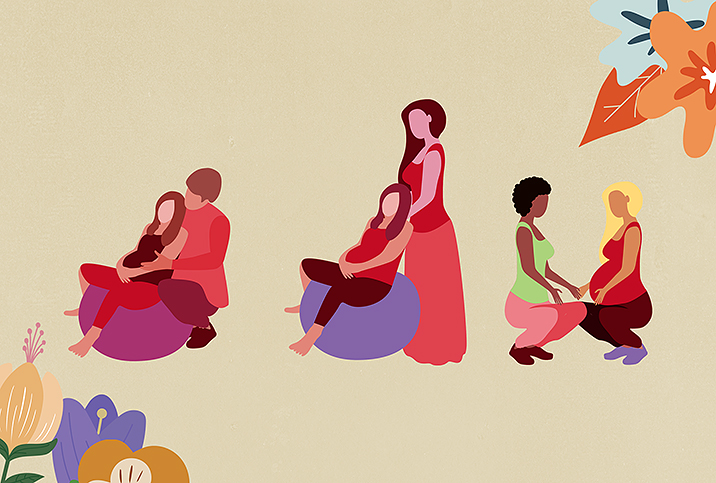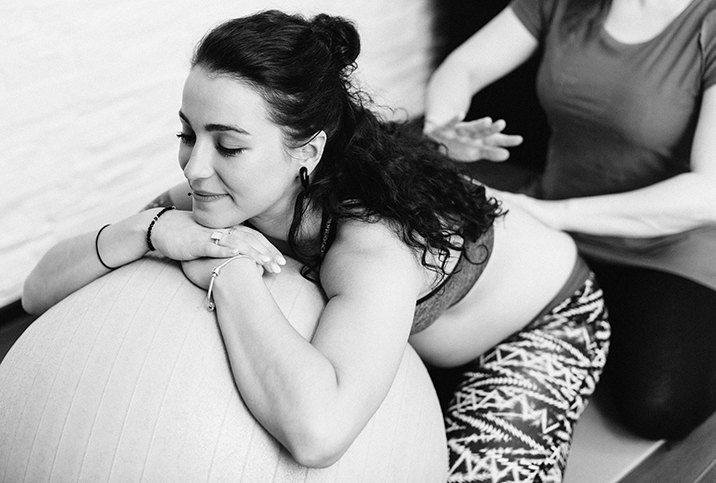Why Hiring a Doula Can Help You Have a Better Delivery Experience

One of the most important elements, if not the most important, of creating a birth plan is deciding who to have in the delivery room. During such a life-changing and vulnerable experience, a solid support system is everything. There will most likely be one or two obvious choices, such as your partner or a close friend or family member, but if you’re considering hiring a doula, the decision is more complicated. You’ll be choosing a stranger to be your advocate and trusting them to guide you through one of the biggest moments of your life.
A doula is "a trained professional who provides continuous physical, emotional and informational support to a mother before, during and shortly after childbirth," according to DONA International, the world’s largest doula certifying organization. "Like travel guides in a foreign country, birthing doulas and postpartum doulas support families through the life-changing experience of having a baby."
Unlike a midwife, a doula is not a medical professional and won’t be the one delivering the baby or handling medical procedures. Instead, a doula will be there to provide encouragement, advice on breathing techniques and physical comfort through touch or massage. A doula can also answer questions, explain procedures and help you communicate with doctors and hospital staff. Postpartum doulas provide assistance after the birth, including emotional, informational and even practical support such as helping with meals and simple household chores.
A good place to begin the search for a doula is DONA International or the National Black Doulas Association. These organizations train and certify doulas and help connect families to doulas in their community. Look for the words "DONA Certified" or "NBDA Certification" to ensure your doula has proper training and experience.
You’ll be choosing a stranger to be your advocate and trusting them to guide you through one of the biggest moments of your life.
The next step is meeting and interviewing potential doulas. Some key things to consider are the doula’s training, certification status, experience, availability, services offered, compatibility and fees. DONA International provides some guidelines on interviewing potential candidates, as well as a list of questions to help you shape your interviews.
"How will you support my partner through this process?" and "How will you interact with my medical team?" are examples as are ones providing logistical information such as "When do you consider yourself 'on call' 24/7 for my birth?" The guidelines also suggest that after each interview, you make notes about how comfortable you were with the doula, how well you and the doula communicated and if you feel confident in the doula’s abilities to collaborate with your birth team.
Each mother’s decision to hire (or not hire) a doula is unique. Many women who decide to have non-medicated, low-intervention “natural births” hire doulas to guide them through pain management techniques. According to American Pregnancy, studies have shown that having a doula present decreases the use of oxytocin by 40 percent and requests for epidurals by 60 percent.
Doulas can also act as advocates for those at risk of discrimination within the healthcare system. "Racism is the driving force of disparities in maternal mortality. And while there is a severe lack of data around the experiences and outcomes of LGBTQ birthing people, particularly for transgender individuals, the discrimination faced by these communities in accessing pregnancy-related care, and health care more broadly, is well documented," according to the Center for American Progress. "Expanding access to midwives and doulas, especially those who are part of the communities they support, can significantly improve the health and birthing outcomes and experiences of people of color and LGBTQ people."
Look for resources specific to your individual needs. Initiatives such as Black Infants and Families Los Angeles offer eligible families free support from birth and postpartum doulas, and LGBTQ Perinatal Wellness Center and other organizations provide doulas and childbirth resources.
The relationship between parents and their doula ideally begins a few months before the baby is born. This allows time to build trust and connection and to also involve the doula in some of the details of your birth plan. A good time to begin searching for a doula is around the fifth month of pregnancy.
"From the beginning of time, women have been cared for and nurtured as they become mothers," states DONA on its website. Whether you work with a doula or surround yourself with the support of your close friends and family, childbirth is a time to be nurtured and cared for.


















